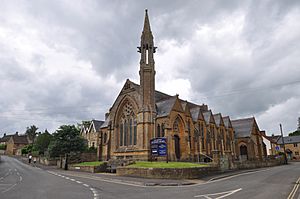Coke Memorial Methodist Church facts for kids
Quick facts for kids Coke Memorial Methodist Church |
|
|---|---|
 |
|
| Religion | |
| Affiliation | Methodist |
| Ecclesiastical or organizational status | Closed |
| Location | |
| Location | South Petherton, Somerset, England |
| Architecture | |
| Architect(s) | Alexander Lauder |
| Architectural type | Church |
| Completed | 1882 |
| Specifications | |
| Capacity | 320 |
| Materials | Hamstone |
The Coke Memorial Methodist Church is a former Methodist church located in South Petherton, Somerset, England. It was designed by Alexander Lauder and built between 1881 and 1882. This historic building has been recognized as a Grade II listed building since 1988. The church stopped holding services in 2023.
Contents
History of the Church
Why a New Church Was Needed
The Coke Memorial Methodist Church was built to replace an older Wesleyan Methodist chapel. That chapel, built in 1809, was located on North Street. It had become too old and uncomfortable for the people who worshipped there.
Remembering Thomas Coke
The new church was planned to honor Rev. Dr. Thomas Coke. He was a Church of England curate in South Petherton from 1772 to 1776. Later, he became a very important person in Methodism. He also helped start the Wesleyan Missionary Society.
Planning and Fundraising
The idea for a new church began in 1875. Rev. J. Bell, who led the South Petherton Methodist circuit, wanted to raise £5,000. This money would build a new chapel, a minister's house, and two schools.
The plan paused until 1881. Then, Rev. J. Workman, Rev. Bell's successor, brought the idea back. He first checked if enough people would support the project. Once he knew there was support, a committee was formed. They started raising money. In April 1881, a meeting helped raise £750 for the project.
Adding a Schoolroom
There was also a need for better schools in the area. So, the plan for the new church included a schoolroom. This room was designed to hold about 200 children. Mr. Alexander Lauder from Barnstaple created the designs for both the church and the schoolroom.
Building the Church
Mr. J. Walter of South Petherton was chosen as the main builder. Messrs. Hallett Bros, also from South Petherton, did the masonry work. Mr. John Trask of Norton-sub-Hamdon handled the stone work.
By August 1881, £1,020 had been raised. On August 10, 1881, a special ceremony took place. Several people laid memorial stones for the church. These included Mrs. W. T. Bradford, Mrs. J. Bradfort, Mrs. Jabez Bradford, Mr. Hosegood, and Mr. W. Steate.
Completion and Opening
The church building was nearing completion in March 1882. On March 25, Master Joseph Workman, Rev. Workman's son, placed the top stone on the church's spire.
The church officially opened for worship on August 24, 1882. A special dedication service was held that day. Many people and local ministers attended. The entire project cost £2,118, which included £500 for the land. At the time of opening, £349 still needed to be raised.
A new organ was added to the church on November 8, 1894. It cost £200 and was built by Mr. F. Minns of Taunton.
Closure of the Church
The Coke Memorial Methodist Church stopped being a place of worship in 2023. The final service was held on October 1, led by Rev. Andrew Longshaw.
Architecture and Design
Building Materials and Style
The church is built using Hamstone, a type of local stone. Its roof is covered with Welsh slate. The building is designed in the Gothic style, which often features pointed arches and tall spires.
Inside the Church
The church was designed to seat 320 people. The seats were made of pitch pine wood. The church has a turret and a spire on its south-eastern side, which stands about 70 feet tall.
The beautiful stained glass in the front window was made by Mr. Swaine Bourne of Birmingham. It was a gift from Mrs. Masters of Devizes, given in memory of her father. The rostrum, which is a platform for speakers, was created by Mr. Pulsford of Barnstaple. The polished steps inside the church are made of Pibsbury stone. This stone came from the quarries of Messrs. Bradford & Sons. These steps were placed as a memorial to Rev. T. W. Smith of Ilminster.
 | Kyle Baker |
 | Joseph Yoakum |
 | Laura Wheeler Waring |
 | Henry Ossawa Tanner |

